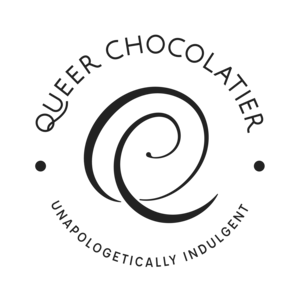Chocolate and Anti-Racism
Chocolate and Anti-Racism
My very first fresh cacao pod, a gift from friend of QC, David Fennig!
Yesterday, friend of QC and local entrepreneur extraordinaire, David Fennig dropped off my very first fresh cocoa pod! I thought it was a very kind gift for him to bring. I'll be pondering what to do with it later today!
But the cocoa pod also got me to thinking quite a bit. And especially the timing of my receiving it. I'm sure David had no idea the gift would put my mind to work in this way, but so it did.
Yesterday was Dr. Martin Luther King Jr. Day.
I sometimes get the sense that other white folks think anti-racist work is drudgery.
But here’s the thing: One of my favorite things to do as the owner of Queer Chocolatier is to excite people about chocolate and tell stories about all the interesting facets of chocolate, but also to empower consumers to make conscious choices about their chocolate purchases through being curious and looking for the stories behind the chocolate they buy. I love to engage kids, college students & professors, Hoosier & Midwestern commodity farmers, health professionals, grandparents, nonprofits organizations, churches, and anyone who sits still long enough to politely listen to my waxing poetic.
This is one way I do anti-racist work. And it is my passion.
Chocolate is a luxurious treat that can also be ubiquitous and ordinary and, alas, cheap. Mass produced chocolate is only possible because of severely cheap cocoa beans produced by oft-exploited cacao farmers and workers.
As such, the chocolate industry has a responsibility to decolonize itself and take on the necessary education AND actions that are anti-racist. It is a duty we should all shoulder as craft chocolate makers, chocolatiers, buyers, and anyone else throughout our industry. I'm lucky to be loosely associated with a group of folks who are doing exactly this. I'm also lucky to know people using the nation's highest court system to push back against the massive corporations who directly benefit from cocoa exploitation.
My physical space at my present location will not last longer than until the end of March. I am not certain about what will be the short-term or long-term future after that time. But I do hope that I can still engage people about chocolate and continue to inspire people to be curious about who makes their food and under what conditions.
Custom map of Venezuela, created by Muncie Map Co. This has been an excellent tool for connecting customers to where their chocolate comes from when I used to source from Chocolates El Rey before I began my bean-to-bar production.
I am, after all, a chocolatier who just happened to open up a sociology shop!
All things related to the sociology of food and agriculture give me a lot of purpose, especially through direct anti-racist work.
Our entire food system needs to be decolonized, not just chocolate.
We need to acknowledge that the term “Food Deserts" obfuscates the underlying policies creating such spaces and shift our language to “Food Apartheid,” a term coined by Karen Washington who is a Black woman farmer in New York.
We need to recognize the true cost of food, not just in dollars, but labor, resources, safety, environmental degradation (or regeneration), the loss (or rediscovery) of food and crop diversity, and the cultural relevance and practices around food for different communities.
We absolutely need to account for the wage theft and poor working conditions that are endemic to our restaurant industry, which is why some restaurateurs have even advocated for the collapse of the industry in the wake of the pandemic in order to reimagine a fair restaurant environment for all.
To that end, continue to be hungry but also remain curious and open to the stories behind the food you eat because it might lead you to walk through doors that activate you into becoming an anti-racist. And it absolutely doesn’t have to be drudgery.
Bean-to-bar chocolate on freshly roasted cocoa beans from Tumaco, Colombia. These beans were purchased through Uncommon Cacao, an organization that goes beyond fair trade by creating direct trade relationships with cacao growers.



